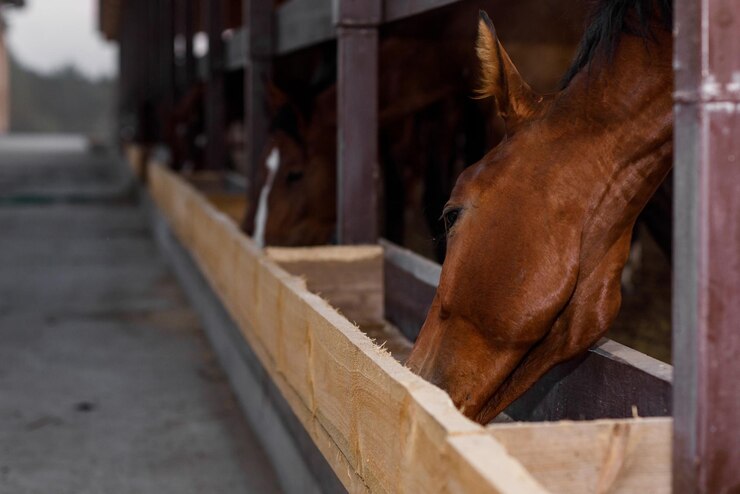Equine nutrition is vital for maintaining the health, performance, and well-being of horses. It requires careful consideration of various food elements to ensure that horses receive a balanced diet. As anyone passionate about horses knows, the right nutrition impacts everything from energy levels to coat condition. Understanding the specifics of equine nutrition helps horse enthusiasts provide the best care possible.

Understanding Equine Digestive System
Horses have a unique digestive system that’s adapted to a continuous grazing lifestyle. Their stomachs are relatively small, and their intestines are long, allowing them to efficiently process a fibrous, plant-based diet. Recognizing the natural dietary habits of horses is essential for ensuring they receive adequate nutrition.
Components of a Balanced Equine Diet
Fibre Essentials
Fibre, found in hay and grass, is the cornerstone of a horse’s diet. It provides the necessary bulk and maintains gut health. Horses require a high intake of fibre daily, approximately 1-2% of their body weight, to keep their digestive systems functioning properly.
Importance of Carbohydrates
Carbohydrates are a significant energy source for horses. They are found in grains like oats, barley, and corn. While essential, it’s important to balance carbohydrate intake to prevent excessive weight gain and metabolic issues.
Proteins for Growth and Repair
Protein is crucial for growth, muscle development, and tissue repair. Horses need quality protein sources like soybean meal to meet their dietary requirements. Depending on the horse’s age, workload, and overall health, protein needs can vary.
Fats for Energy
Fats are a concentrated energy source and can be particularly beneficial for performance horses. Oils such as those from flaxseed or rice bran offer healthy fat options for horses.
Vitamins and Minerals
Vitamins and minerals are essential for various bodily functions. Horses require vitamins such as A, D, and E, as well as minerals like calcium and phosphorus. Ensuring these are in balanced proportions is critical for preventing deficiencies. You can read more about essential dietary deficiencies in horses.
Special Dietary Needs
Horses at different life stages or with specific health issues may have unique nutritional requirements. Lactating mares, for example, need increased protein and calcium levels. Visit this guide to feeding lactating mares for more tailored information.
Common Feeding Practices and Mistakes
Regular Feeding Schedule
Horses thrive on routine, and establishing a regular feeding schedule is beneficial. Learn about the ideal summer feeding schedule.
Avoiding Overfeeding
Overfeeding, especially grains, can lead to obesity and other health concerns like laminitis. Understanding a horse’s specific calorie needs is essential.
Hydration and Its Importance
Water is often overlooked but is the most critical nutrient. Horses should always have access to fresh, clean water to prevent dehydration and ensure optimal digestion.
Adjusting Diets for Seasonal Changes
Horses’ nutritional needs can change with the seasons. For example, as grazing becomes lush in spring, adjustments may be required to prevent excessive weight gain. Discover the best times to feed horses considering these changes.
Choosing the Right Commercial Feeds
Commercial feeds can complement a horse’s diet when natural forage isn’t sufficient. Its important to choose products that meet an individual horses nutritional requirements without unnecessary additives. If you’re considering sweet feed, explore what sweet feed really offers.
Signs of Nutritional Deficiencies
Common signs include dull coat, weight loss, and lethargy. Routine veterinary check-ups can help diagnose and address these issues early.
Consulting with Nutrition Experts
Veterinarians and equine nutritionists can provide personalized feeding plans that cater to your horse’s unique needs and activity levels.
Conclusion
Understanding equine nutrition is crucial for anyone responsible for the care of horses. By providing a well-balanced diet tailored to your horse’s needs, you ensure not only their health but also enhance their overall quality of life.

FAQs
- What is the most important nutrient for horses?
Water is the most vital nutrient for horses survival and health. - How often should I feed my horse?
Horses do best with regular, twice-daily feedings, adjusting for individual needs. - Can horses live on grass alone?
While grass forms the primary diet, supplementary feed may be necessary depending on their energy requirements and pasture quality.
This article contains affiliate links. We may earn a commission at no extra cost to you.








